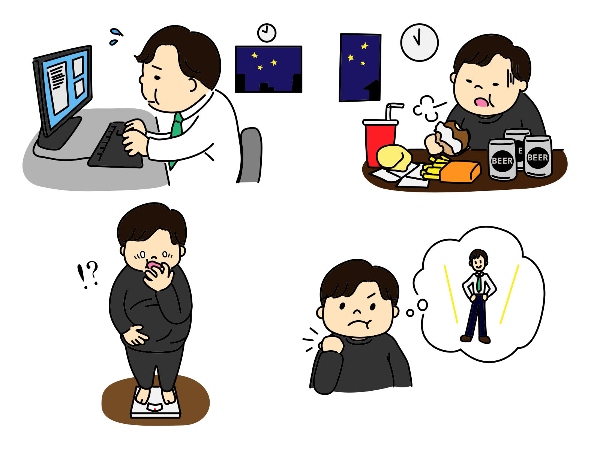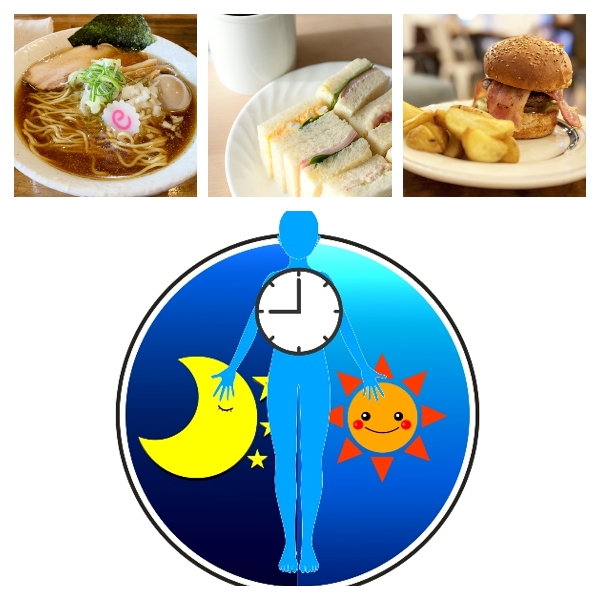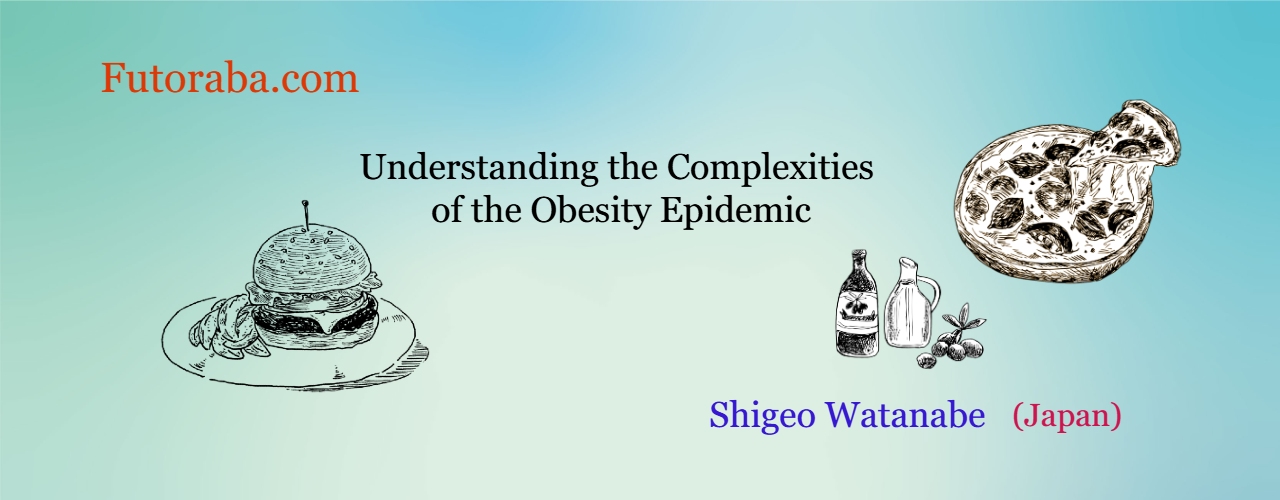Topics
09/08/2023
"When to Eat" Is Important, but It Should Be Paired With "What to Eat"
Contents
- What is chrono-nutrition?
- The importance of meal timing in the recent surge in obesity
- My thoughts
Chrono-nutrition has become increasingly important in recent years, and I have provided a brief background on this topic. At the end of this article, I would like to explain how my intestinal starvation theory relate to “when to eat.”
1. What is chrono-nutrition?
・Living organisms on the earth synchronize their activity to a 24-hour light and dark cycle generated by the rotation of the earth. This biological rhythm is called the circadian rhythm, which means “approximately one day.” Biological clocks are organisms’ natural timing devices, regulating the cycle of circadian rhythms. Recent studies have shown that clock genes such as BMAL1, CLOCK, PERs, and CRYs play central roles in the oscillation of the circadian rhythm[1].
・The circadian clock can be divided into two parts: the master clock, located in the suprachiasmatic nucleus (SCN) of the hypothalamus, which receives light cues, and the peripheral clocks that reside in organs and tissues throughout the body.

External stimuli (time cues) such as the light-dark cycle and the timing of food intake provide daily signals for entrainment (time-setting) of the master clock, and of metabolic rhythms in peripheral tissues, respectively[2].
Peripheral clocks are highly responsive to food intake in addition to the entrainment (synchronizing action) from the master clock.
・‘Chrono-nutrition’ is the study of the interaction between biological rhythms and nutrition, and the relationship between these factors and human health. Chrono-nutrition encompasses distribution of energy, frequency and regularity of meals, duration of the eating period, and the relative importance of these factors on metabolic health and risk of chronic disease. A growing body of evidence in human studies indicates that the timing of food intake throughout the day can have a significant impact on metabolic health and general well-being[3].
In Japan, it is generally believed that in addition to "what and how much" you eat, "when and how” you eat is considered important for maintaining metabolic health.
2. The importance of meal timing in the recent surge in obesity
(1)“What and when we eat” has changed dramatically in modern society.
Mistimed food intake in connection with the day/night cycle, such as skipping breakfast or eating later in the day, can disrupt circadian rhythms, which has been hypothesized to contribute to the development of obesity and associated cardiometabolic disorders[4].

(2) There is a 3.5-year follow-up study showing that consuming a larger proportion of energy earlier in the day or at lunch, appeared to reduce the risk of weight gain[5].
On the other hand, previous observational studies in humans, have linked late eating with a higher risk of obesity and impaired dietary weight loss success that could not be explained by differences in reported caloric intake or physical activity [6].
(3) A short-term study (randomized controlled crossover trial) published in 2022 reported that late eating increases hunger, decreases metabolism, and alters molecular pathways involved in lipid metabolism[7], but it remains unproven whether it makes people obese in the long run.

(4) Previous observational studies suggest that meal timing itself might influence body weight, independent of changes in energy intake and activity-related energy expenditure[8].
The mechanism behind the observed increased risk of obesity and weight gain in shift workers and in populations frequently eating late at night is likely to be multifaceted, and it cannot be explained by disrupted energy intake alone[9].
3. My thoughts
While “total daily caloric intake” is still being emphasized, I think it is a step forward that people are beginning to understand the importance of "when to eat,” even if it is the same caloric intake. And it has been my own experience that incorrect meal timing disrupts my biological rhythms, and I have no doubt that the discovery of clock genes will continue to increase the importance of this field.
In fact, my intestinal starvation theory is related to "circadian rhythms" and "chrono-nutrition.” This is because the gastrointestinal tract gets active when food is consumed. I believe my theory also explains why a well-balanced breakfast and regular eating habits can prevent weight gain, and why irregular lifestyles lead to an increased risk of obesity.
As quoted in section 2 above, some observational studies suggest that "mistimed food intake such as eating later in the day is linked to a higher risk of obesity that cannot be explained by disruption of caloric intake alone." But as I have explained throughout this blog, I don’t believe that obesity itself is directly related to the amount of calories consumed or burned.

An unbalanced diet skewed toward easily digestible refined carbohydrates, protein, and processed foods is more likely to cause intestinal starvation when combined with irregular meal timing. This typical meal timing pattern is represented by skipping breakfast or eating late at night.
If obesity cannot be easily treated by returning to eating at regular times during the day, it means that one's set-point for body weight has increased.
[Related article]
In other words, "when to eat" is important, but "what and how to eat" is important as well, and I believe they must always be considered as a set. If we focus only on caloric intake, we may forget the importance of traditional eating styles and dietary balance. (Note: Some Japanese nutritionists often stress how important the traditional Japanese diet is in addition to "what, when, and how you eat” for maintaining good health, and I totally agree with them on that point.)
In the category of "chrono-nutrition," I'll break it down into four articles on (1) breakfast, (2) late dinners, (3) frequency of eating, and (4) irregular meals, and explain in more detail how they relate to my intestinal starvation theory.
[Related article]
The Reason Why a Well-Balanced Breakfast Helps to Prevent Weight Gain
References:
[1]”What is a circadian rhythm?”, MEDICAL & BIOLOGICAL LABORATORIES CO., LTD.
[2] [3]Flanagan A et al., Chrono-nutrition: From molecular and neuronal mechanisms to human epidemiology and timed feeding patterns. J Neurochem. 2021 Apr;157(1):53-72. doi: 10.1111/jnc.15246. Epub 2020 Dec 10. PMID: 33222161.
[4] [5][9]Davis R et al., The Impact of Meal Timing on Risk of Weight Gain and Development of Obesity: a Review of the Current Evidence and Opportunities for Dietary Intervention. Curr Diab Rep. 2022 Apr;22(4):147-155. doi: 10.1007/s11892-022-01457-0. Epub 2022 Apr 11. PMID: 35403984; PMCID: PMC9010393.
[6][7][8] Vujović N et al., Late isocaloric eating increases hunger, decreases energy expenditure, and modifies metabolic pathways in adults with overweight and obesity. Cell Metab. 2022 Oct 4;34(10):1486-1498.e7. doi: 10.1016/j.cmet.2022.09.007. PMID: 36198293; PMCID: PMC10184753.

